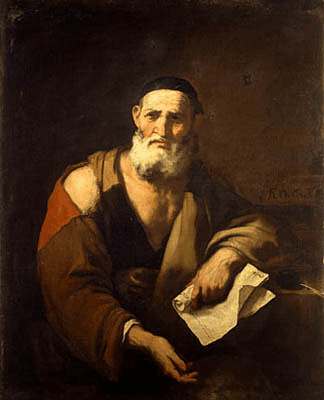<Back to Index>
- Philosopher Leucippus (Λεύκιππος), 5th Century B.C.
PAGE SPONSOR

Leucippus or Leukippos (Greek: Λεύκιππος, first half of 5th century BCE) was one of the earliest Greeks to develop the theory of atomism — the idea that everything is composed entirely of various imperishable, indivisible elements called atoms — which was elaborated in greater detail by his pupil and successor, Democritus. A possible earlier candidate for atomism is Mochus of Sidon, from the Trojan War era (13th or 12th century BCE).
He was most likely born in Miletus, although Abdera and Elea are also mentioned as possible birth - places.
Leucippus is a shadowy figure, as his dates are not recorded and he is often mentioned in conjunction with his better known pupil Democritus, who replaced indeterminism with determinism as the ontological cause of atomic movement. It is therefore difficult to determine which contributions come from Democritus and which come from Leucippus.
In his Corpus Democriteum, Thrasyllus of Alexandria, an astrologer and writer living under the emperor Tiberius (14 - 37 CE) compiled a list of writings traditionally attributed to Democritus to the exclusion of Leucippus.
Leucippus was an Ionian Greek (Ionia, now part of western Turkey), as was Anaxagoras. And he was a contemporary of Zeno of Elea and Empedocles (Magna Graecia, now part of southern Italy). He belonged to the same Ionian School of naturalistic philosophy as Thales, Anaximander, Anaximenes, and he was interested in reality and not idealism as the Italic Eleatics were. Later stories about the influence of Zeno have been questioned by modern studies, also because the ontological conception of being of the Eleatics is static, monistic and deterministic, while Leucippus' is dynamic, pluralistic and indeterministic.
Around 440 or 430 BCE Leucippus founded a school at Abdera, which his pupil, Democritus, was closely associated with. His fame was so completely overshadowed by that of Democritus, who systematized his views on atoms, that Epicurus doubted his very existence.
However, Aristotle and Theophrastus explicitly credit Leucippus with the invention of Atomism. Leucippus agreed with the Eleatic argument that true being does not admit of vacuum, and there can be no movement in the absence of vacuum. Leucippus contended that since movement exists, there has to be vacuum. However, he concludes that vacuum is identified with non - being, since it cannot really be. Leucippus differed from the Eleatics in not being encumbered by the conceptual intermingling of being and non - being. Plato made the necessary distinction between grades of being and types of negation.
The most famous among Leucippus' lost works were titled Megas Diakosmos (The Great Order of the Universe or The great world - system and is not to confuse with Micros Diakosmos (Little Cosmology) of Democritus) and Peri Nou (On mind).
Fragments and doxographical reports about Leucippus were collected by Hermann Diels (1848 – 1922), firstly in Doxographi Graeci (1879) and then in Die Fragmente der Vorsokratiker (1903). The probably true fragment of Leucippus is the Great Cosmology fragment that says: "The cosmos, then, became like a spherical form in this way: the atoms being submitted to a casual and unpredictable movement, quickly and incessantly."